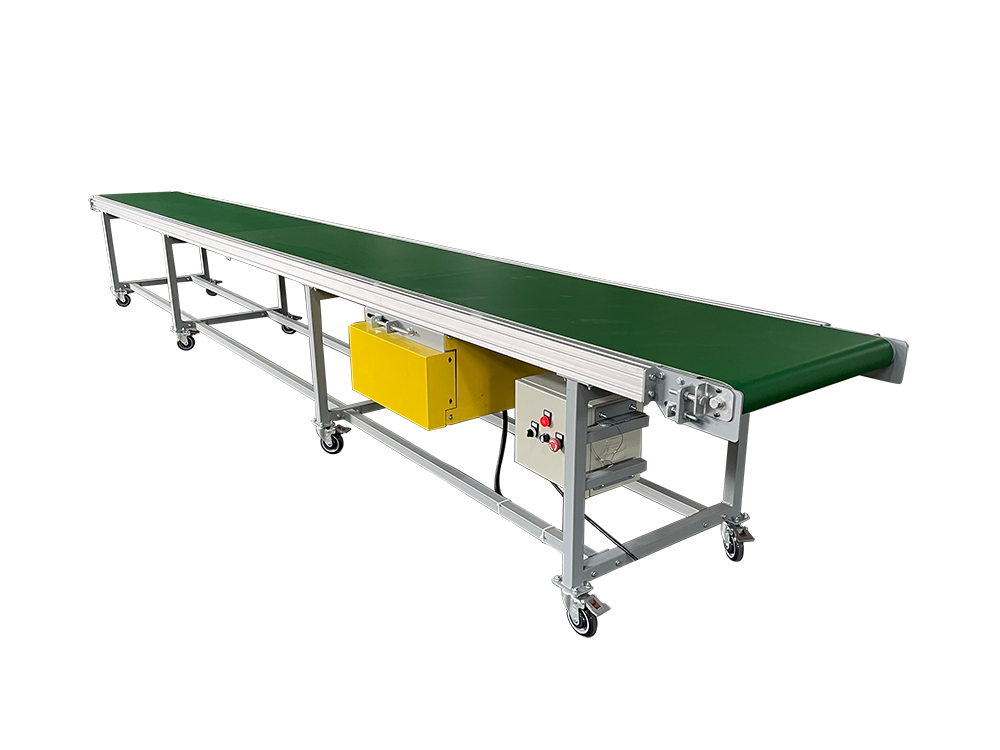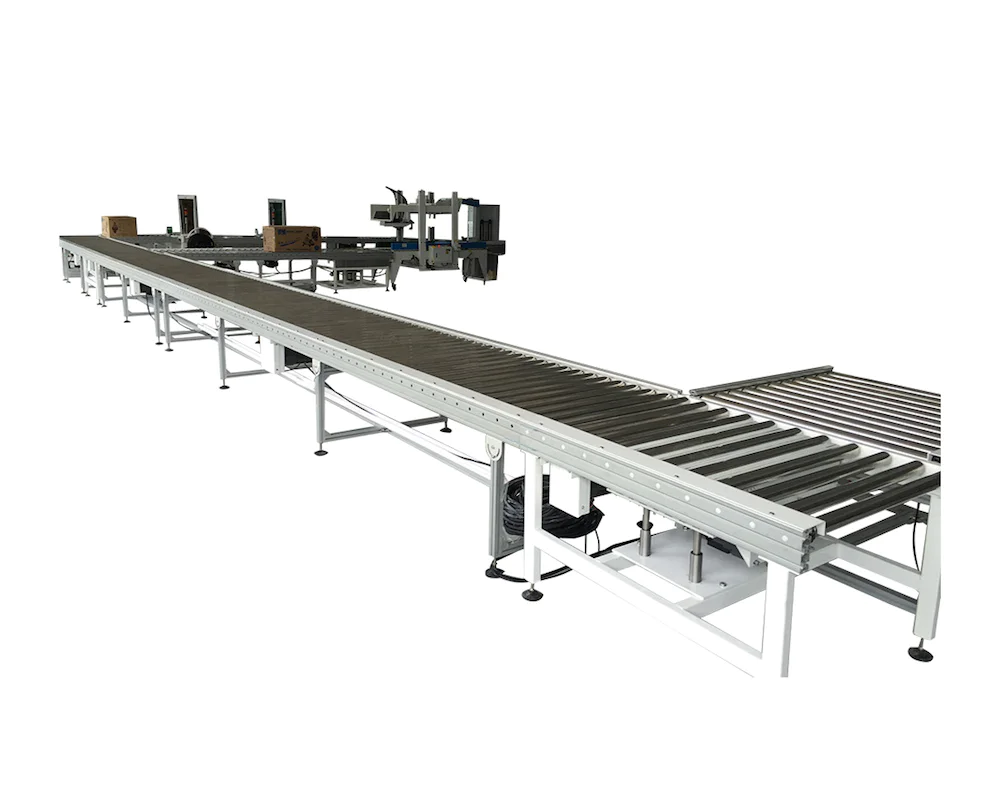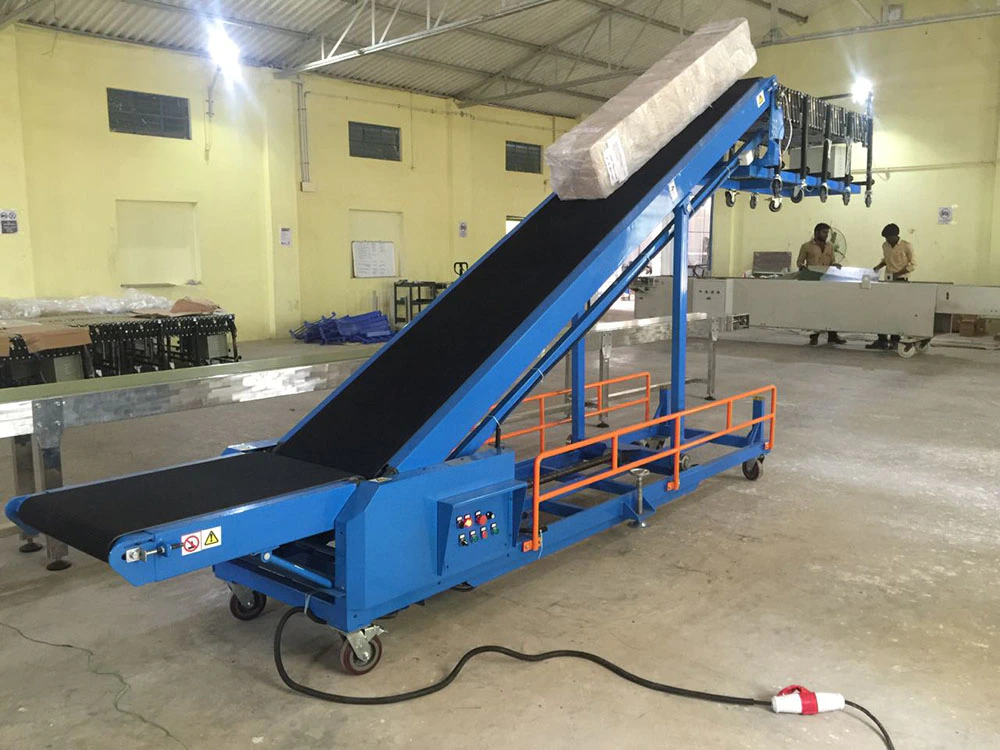YiFan Conveyor - Conveyor Manufacturer and One-Stop Solution Service Provider for Truck Loading Conveyor and Flexible Roller Conveyor System.
Why Conveyors Are Always Used In the Wood And Furniture Industry?
You might not think about it, but conveyors are the unsung heroes in the wood and furniture industry. Let’s paint a picture: the wood and furniture industry, a bustling hub of creativity and craftsmanship, thrives on precision and efficiency.
At the heart of this dynamic environment are conveyor systems, tirelessly working behind the scenes. These systems are more than just mechanical belts or rollers; they are the lifelines that keep the industry’s pulse beating.
Why are conveyors indispensable, you ask? Imagine trying to manually handle every piece of wood or furniture component through each production stage. It's not just labor-intensive; it's a logistical nightmare. Conveyors simplify these complexities, ensuring a seamless flow of materials. They’re like the industry's diligent workers, consistently and reliably carrying the load, quite literally, from point A to B.
Types Of Conveyors Used In The Wood And Furniture Industry
Conveyors in the wood and furniture industry are as diverse as the products they help create. They're not just about moving materials; they're about enhancing productivity, precision, and safety. Let's dive into the types of conveyors that are essential in this industry and understand why they're indispensable.
Belt Conveyors
Belt conveyors are the industry's steadfast partners. Picture a continuous belt running over pulleys, efficiently moving everything from raw wood to finished furniture pieces. Their versatility is unmatched. Whether it's fine sawdust or bulky furniture parts, these conveyors handle it all with ease. What makes them so valuable? They can provide a smooth, consistent flow of materials, minimizing disruptions and keeping the production line humming.
The beauty of belt conveyors lies in their simplicity and efficiency. They can be customized with different belt materials and configurations, ensuring they meet the specific needs of any woodworking operation. They're not just about moving things; they're about moving your business forward.
Roller Conveyors
Now, let's roll into the world of roller conveyors. These are the industry's strategic assets, especially for handling heavy or bulky items. Imagine a series of rollers, spinning in harmony, effortlessly moving large pieces of wood or furniture parts. They’re perfect for stages where precision and control are crucial.
Why are roller conveyors a key player? They make loading and unloading a breeze. Plus, they're modular and easily integrated into existing workflows. They’re not just conveyors; they’re solutions that adapt to your needs, enhancing efficiency and productivity in the process.
Overhead Conveyors
Overhead conveyors are the unsung heroes, especially in spaces where floor real estate is at a premium. They're like the high-fliers of the conveyor world, transporting goods overhead, maximizing space utilization, and keeping the production floor less cluttered. This isn’t just about saving space; it’s about optimizing it.
The Impact Of Conveyor Systems On Productivity And Efficiency
In the bustling arena of wood and furniture manufacturing, conveyor systems are the silent champions of productivity and efficiency. They are the unseen force that seamlessly bridges various stages of production, ensuring a smooth, uninterrupted flow of work.
Enhancing Production Flow
Conveyors don't just move things; they're the rhythm that keeps the production line dancing smoothly. They streamline processes, ensuring that each piece of wood or furniture component arrives exactly where it needs to be, exactly when it's needed. This synchronization is like a well-conducted orchestra, where every movement is precise and timely.
Reducing Labor and Costs
Let’s talk numbers. Conveyors significantly cut down labor requirements and operational costs. They're doing the heavy lifting, both literally and figuratively. This means fewer manual tasks, less fatigue among workers, and a more efficient allocation of human resources. In the big picture, it translates to lower production costs and higher profits.
Improving Safety and Ergonomics
Safety is paramount, and conveyors are key players in making workplaces safer. They minimize the need for manual handling, reducing the risk of injuries. Also, by improving ergonomics, they create a better, more comfortable working environment. Happy workers, efficient processes – it’s a win-win.
Customization And Adaptability Of Conveyors In Woodworking
In the dynamic world of woodworking, the ability to customize and adapt is key, and conveyors are at the forefront of this flexibility. They are not just about moving materials; they are about molding to the unique demands of each workshop and project.
● Tailoring to Specific Needs: One size does not fit all in the wood and furniture industry. That's where customization comes into play. Conveyors can be tailored to meet specific operational needs, whether it's size, shape, or function. This adaptability ensures that every woodworking challenge is met with a solution that fits like a glove.
● Integration with Other Technologies: Conveyors don’t work in isolation; they’re team players. Integrating them with other technologies, like CNC machines or automated sorting systems, elevates their role. This integration leads to a more cohesive production process, where efficiency is not just a goal but a reality.
● Streamlined Production: Conveyors significantly streamline the manufacturing process. They efficiently transport materials from one stage to another, ensuring a smooth, continuous flow of work. This leads to increased productivity and a faster turnaround time for products.
● Labor Efficiency: By automating the transport of materials, conveyors reduce the need for manual labor. This not only cuts down on labor costs but also minimizes human error and increases overall efficiency.
● Enhanced Safety: Manual handling of wood and furniture components can be risky, leading to potential injuries. Conveyors minimize these risks by automating the transport process, thereby enhancing workplace safety.
● Improved Product Quality: Consistent handling of materials is key to maintaining product quality. Conveyors provide a controlled and consistent movement of materials, which helps in maintaining the integrity and quality of the final products.
● Scalability and Flexibility: Conveyors can be customized and scaled to fit the specific needs of a woodworking operation, whether it’s a small workshop or a large industrial manufacturer. This adaptability makes them a versatile solution across various scales of operation.
● Cost-Effective: In the long run, conveyors are a cost-effective solution. They improve efficiency and productivity, reduce labor costs, and minimize the likelihood of errors and material wastage.
● Space Optimization: Especially in the form of overhead conveyors, they help in optimizing the space in a manufacturing unit, making more room for other essential processes.
Conclusion
Conveyors are more than just mechanical systems; they’re the backbone of the wood and furniture industry. They symbolize efficiency, innovation, and the relentless pursuit of perfection. As we look towards the future, one thing is clear: conveyors will continue to play a pivotal role in shaping the industry.
Are you intrigued? Want to delve deeper into the world of conveyor solutions? Don’t just stop here. There’s a whole world of innovative conveyor systems waiting to be explored. Dive in, and discover how they can transform your operations. The future is moving; move with it.

Get in touch with us
QUICK LINKS
PRODUCTS
CONTACT US
E-Mail : sales01@yfconveyor.com
24 Hour Hotline : +86 13958241004
Add: No.77,Heyi Road,Gulou Street,Haihu,Ningbo China













